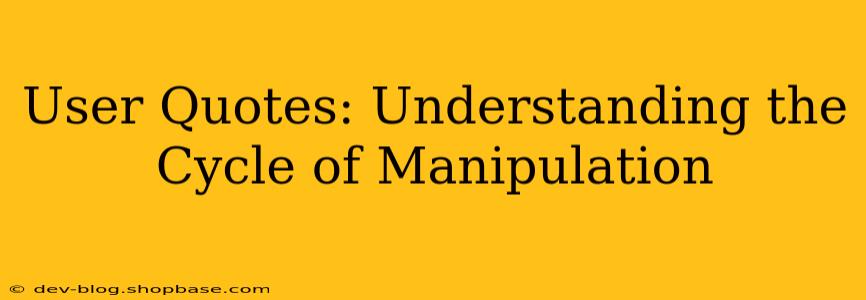In the digital age, understanding user quotes and their role in manipulative cycles is crucial. User quotes, seemingly innocuous snippets of feedback or testimonials, can be subtly twisted and weaponized to achieve manipulative goals. This article delves into the mechanics of this manipulation, revealing how seemingly authentic user quotes can fuel deceptive marketing and harmful online behavior.
What are User Quotes and How are They Used?
User quotes, also known as customer testimonials or reviews, are short statements from individuals expressing their experiences with a product, service, or brand. Legitimate user quotes offer genuine insights and build trust. However, their inherent power makes them susceptible to exploitation. Manipulators can selectively choose quotes, edit them out of context, or even fabricate them entirely to create a false narrative. This can range from inflating the perceived quality of a product to manipulating public opinion about a person or organization.
How User Quotes are Manipulated in Marketing
Many businesses employ user quotes in their marketing materials. While some do so ethically, others engage in manipulative practices. Here's how:
- Cherry-picking positive quotes: This involves selecting only positive feedback while ignoring negative comments, creating a skewed perception of reality.
- Editing quotes out of context: A phrase taken out of its original context can dramatically alter its meaning, leading to a misleading interpretation.
- Fabricating quotes: In the worst cases, companies may create entirely false quotes to bolster their image, a practice that is both unethical and illegal.
- Using fake accounts to generate reviews: Creating fake profiles and accounts to post positive reviews is another common manipulative tactic. These fake reviews often lack detail and seem overly enthusiastic.
How User Quotes Contribute to Online Harassment and Bullying
The manipulation of user quotes isn't limited to marketing. They can also be used as weapons in online harassment and bullying. Manipulators might:
- Twist comments to make someone appear negative or malicious: A carefully selected excerpt can be used to portray someone in a false light, damaging their reputation.
- Spread misinformation using fabricated quotes: False quotes can be disseminated to create damaging narratives about individuals or groups.
- Use quotes to fuel online hate campaigns: User quotes, real or fake, can be amplified and shared repeatedly to fuel online hate and harassment campaigns.
How to Identify Manipulated User Quotes
Recognizing manipulated user quotes requires critical thinking. Look for the following red flags:
- Lack of context: Is the quote presented without sufficient background information?
- Overly positive or negative language: Are the quotes overwhelmingly positive or negative, lacking nuance?
- Inconsistencies in style or tone: Does the quote's style or tone differ significantly from other reviews or the user's other online activity?
- Inability to verify the source: Can you independently verify the authenticity of the quote and the user who provided it?
- Suspicious online profiles: Does the user profile appear fake or created solely for the purpose of leaving reviews?
What are the ethical implications of manipulating user quotes?
The ethical implications of manipulating user quotes are significant. This deceptive practice undermines trust, erodes transparency, and can have severe consequences for individuals and organizations. It's essential to maintain ethical standards in the use of user quotes, ensuring transparency and accuracy in their presentation. Failure to do so can result in legal repercussions, reputational damage, and loss of consumer trust.
What legal recourse is available against manipulation of user quotes?
Depending on the nature and extent of the manipulation, legal recourse may be available. Depending on jurisdiction, laws against defamation, false advertising, and consumer protection could apply. Consulting with legal professionals to understand your rights and options is crucial.
Conclusion: The Importance of Media Literacy
The manipulative use of user quotes highlights the critical importance of media literacy. Developing critical thinking skills and learning to identify manipulative tactics empowers individuals to navigate the digital world responsibly and avoid falling victim to misinformation and deception. By understanding how user quotes can be manipulated, we can collectively work towards a more honest and trustworthy online environment.

